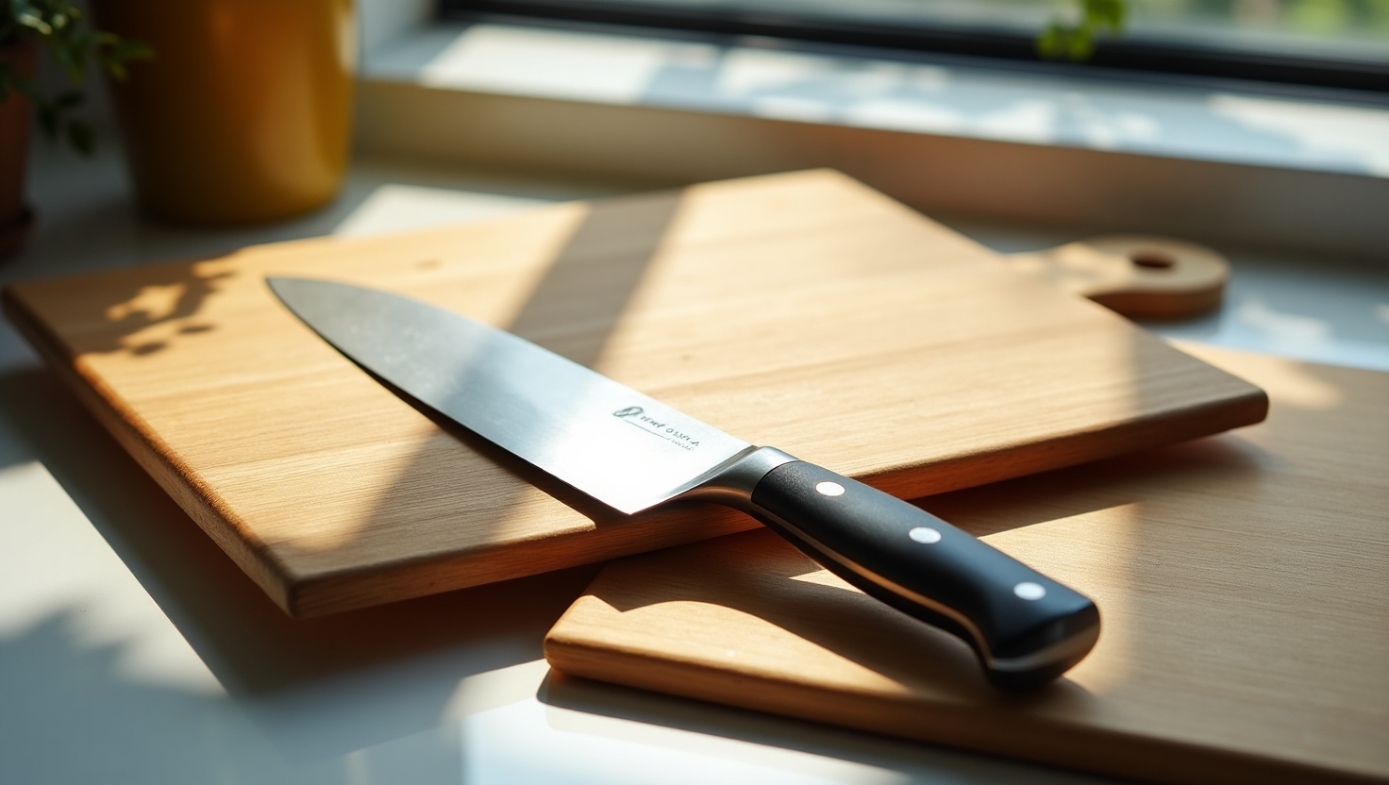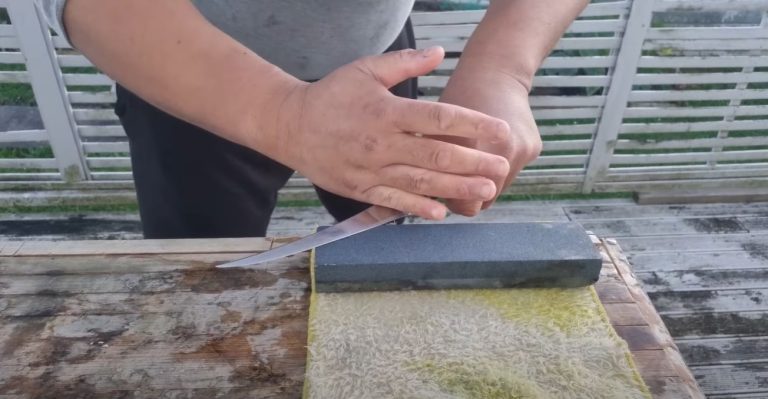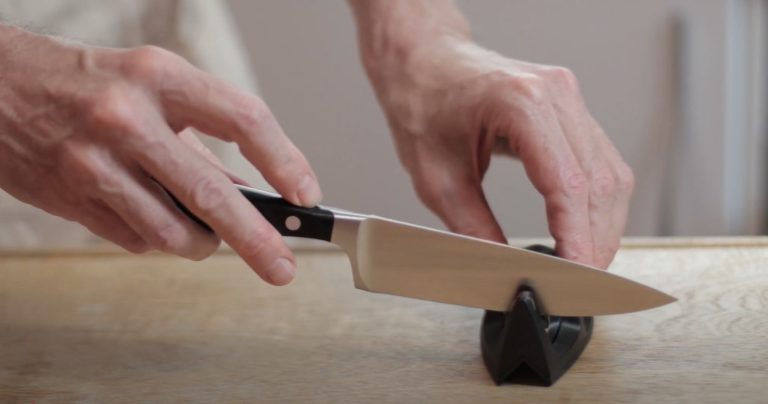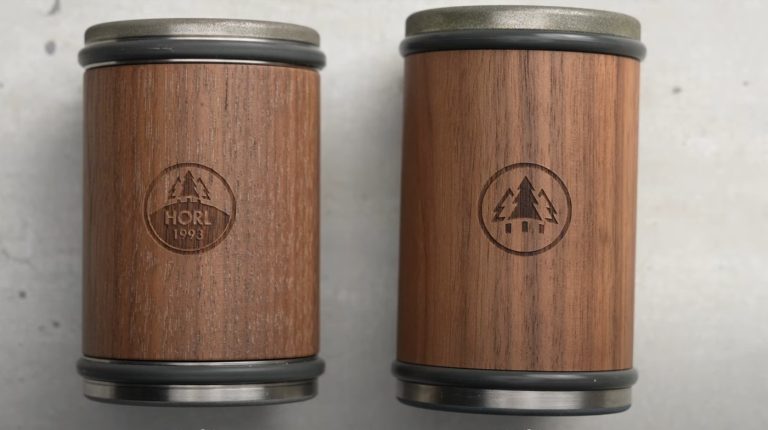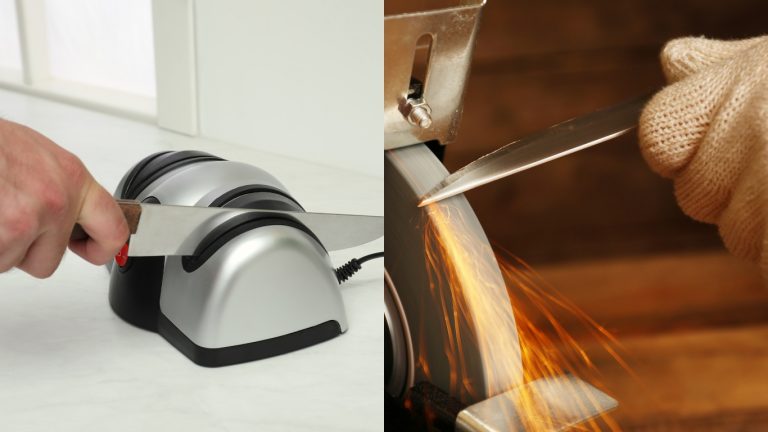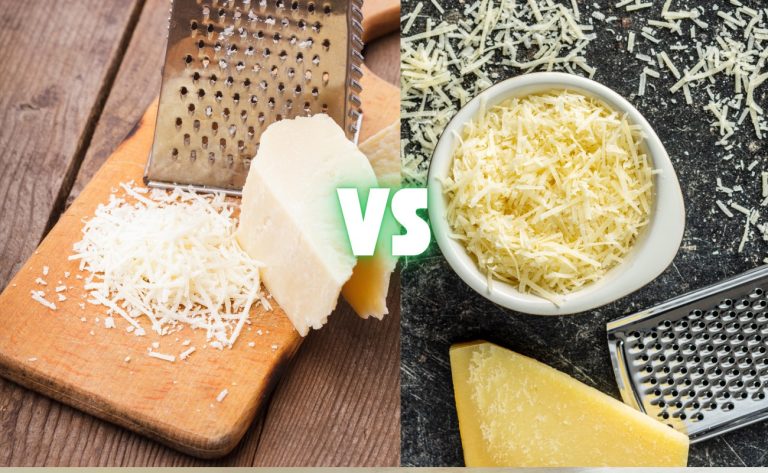Do Bamboo Cutting Boards Dull Knives: A Sharp Look at the Facts
If you’re wondering whether bamboo cutting boards dull knives, the answer is yes, they can dull them slightly faster than softer woods.
Bamboo’s natural hardness and density create more friction on your blade, leading to quicker wear. However, with proper technique and regular sharpening, you can manage this effect easily.
It’s not as harsh on knives as glass or ceramic surfaces. Stick around to uncover deeper insights into maintaining your tools and boards effectively.
Key Takeaways
- Bamboo cutting boards can slightly dull knives faster than softer woods due to their density and hardness.
- The high silica content in bamboo contributes to minimal blade wear, but it’s less abrasive than glass or ceramic.
- Proper cutting techniques, like avoiding cross-grain cuts, help reduce knife edge dulling on bamboo boards.
- Regular knife sharpening with whetstones can easily manage any wear caused by bamboo surfaces.
- Compared to glass, bamboo is gentler on knives, making it a safer choice for blade longevity.
Bamboo Cutting Board Properties
As you explore the world of kitchen essentials, you’ll find that bamboo cutting boards stand out for their remarkable properties. Crafted from a fast-growing, renewable grass, they’re a sustainable choice that matures in just 3-7 years.
You’ll appreciate their durability, as bamboo’s hardness resists scratches and dents better than many hardwoods. Moreover, bamboo’s natural moisture resistance prevents warping and cracking, ensuring longevity in your kitchen. With proper care, such as regular oiling, they can last for decades.
Its antimicrobial traits help maintain cleanliness, reducing safety concerns. You can also use these versatile boards as elegant serving platters, thanks to their smooth grain and light, natural tones. Additionally, bamboo is gentle on knife edges, preserving sharpness during use.
Lightweight and easy to handle, bamboo cutting boards blend functionality with style, making them a must-have for any discerning home cook.
How Bamboo Affects Knife Edges?
Let’s shift focus from the impressive qualities of bamboo cutting boards to how they interact with your kitchen knives. Bamboo’s higher density creates more friction, accelerating wear on your blade edges, especially with stainless steel knives.
Its natural hardness can challenge softer metals, though carbon steel holds up better due to its superior edge retention.
You’ll notice a slight increase in dulling compared to some hardwoods, but it’s manageable with proper technique. Keep your knife sharp and maintain blade angle to counter bamboo’s firm surface.
Avoid cross-grain cuts to reduce resistance, and hone regularly to fix edge rolling. Bamboo’s high silica content contributes to its hardness, making it particularly tough on knife edges high silica content.
Treat your board with food-grade mineral oil to minimize friction, and clean it immediately after use to prevent uneven surfaces.
Comparing Bamboo to Other Cutting Board Materials
As you evaluate cutting board options, you’ll notice bamboo stands out against wood surfaces like maple and teak for its sustainability, though it can be tougher on knife edges due to its density.
Compare that to glass boards, where you’ll find a non-porous, hygienic surface that’s easy to clean but harsh on blades and prone to shattering if dropped.
Let’s break down these differences to help you choose the best material for your kitchen needs.
Bamboo also offers natural antimicrobial properties, making it a hygienic choice for food preparation with resistant to bacteria.
Bamboo vs. Wood Surfaces
When comparing bamboo to traditional wood surfaces for cutting boards, you’ll quickly notice distinct differences in how they impact your knives and kitchen workflow.
Bamboo’s hardness, with a Janka rating of 1,380-1,600, often surpasses hardwoods like maple, causing faster knife edge wear due to dense, compressed fibers.
In contrast, softer woods or end-grain boards like walnut absorb impact, preserving blade sharpness longer. End grain wood boards, with their vertical fiber orientation, also minimize knife dulling by allowing blades to slide between fibers rather than cut across them.
Additionally, bamboo’s silica content and adhesive-laminated strips can create abrasive, uneven surfaces that stress knife edges over time. Wood, with its natural, flexible grain, offers a gentler cutting experience.
While bamboo resists scars and requires less maintenance with its quick-drying, waxy finish, wood prioritizes blade longevity. Moreover, bamboo’s natural softness can be gentle on knives, reducing wear compared to harder materials in some contexts.
Bamboo vs. Glass Boards
While exploring cutting board options, you’ll find that bamboo and glass present stark contrasts in their impact on your knives and kitchen functionality. Bamboo, with its dense, compressed fibers, can dull knives faster than softer woods but offers some give, reducing severe edge damage.
Glass, however, is extremely hard and unforgiving, causing rapid micro-chipping and dulling of blades. Additionally, bamboo is often praised for its eco-friendly nature due to its rapid growth and sustainability rapid growth sustainability.
Wooden boards, like butcher blocks, also provide a knife-friendly surface with natural antimicrobial properties.
Consider this comparison to guide your choice:
| Aspect | Bamboo | Glass |
|---|---|---|
| Knife Dulling | Moderate impact, some give | Severe impact, no give |
| Maintenance | Easy to dry and handle | Simple to clean, non-porous |
| Practicality | Ideal for daily use | Less practical, risks damage |
Maintenance Tips for Knives and Boards
If you’re looking to keep your bamboo cutting boards and knives in top condition, proper maintenance is essential.
For knives, sharpen them regularly using whetstones to maintain a keen edge, and hone them often to prevent wear. Use proper grip and cutting angles to minimize friction on the bamboo surface, reducing dullness. Be aware that harder surfaces like marble can accelerate blade dulling, so stick to bamboo for gentler knife care.
For your bamboo boards, clean them immediately after use and avoid the dishwasher to prevent damage. Dry them with a towel or let them air out to avoid warping. Remember to oil the board at least once per month to maintain its durability and prevent cracking oil the board.
Apply food-grade mineral oil evenly to hydrate and protect the surface, and sanitize with vinegar or bleach solutions. Don’t soak the boards or use harsh chemicals.
Practical Benefits of Using Bamboo Boards
As you explore kitchen essentials, you’ll find bamboo cutting boards offer a remarkable array of practical benefits. They’re sustainable, durable, and hygienic, making them a smart choice for any kitchen.
You’ll appreciate their lightweight versatility for cutting or serving, plus their budget-friendly cost with minimal upkeep. Additionally, bamboo’s natural density helps resist knife scarring, ensuring a smoother surface over time.
Check out these standout advantages:
| Feature | Benefit | Impact |
|---|---|---|
| Sustainability | Fast-growing, biodegradable | Low environmental footprint |
| Durability | Warp-resistant, long lifespan | Fewer replacements needed |
| Hygiene | Antimicrobial, stain-resistant | Cleaner food prep surface |
| Versatility | Dual-purpose, heat-resistant | Multi-use for cooking and serving |
Debunking Myths About Bamboo and Knife Wear
When it comes to bamboo cutting boards, you’ve likely heard the persistent myth that they dull your knives faster than other materials. Don’t fall for it.
Heard the rumor that bamboo cutting boards dull knives quicker than other surfaces? Ignore it. This common myth simply doesn’t hold up.
The truth is, bamboo’s generally softer than glass or ceramic, which are notorious for ruining edges. While bamboo has harder nodes and silica content, research shows it doesn’t markedly wear knives more than wood or plastic.
Here’s why you shouldn’t worry:
- Softness: Bamboo’s softer surface reduces knife wear compared to rigid materials.
- Silica Impact: Its silica content isn’t abrasive enough to cause major dulling.
- Node Hardness: Nodes create uneven wear, but it’s minimal with proper use.
- Data: Limited evidence suggests bamboo’s impact on knives is comparable to other soft surfaces.
- Edge Retention: However, bamboo’s hard glue and silica can still contribute to noticeable edge degradation over time.
Choosing the Best Cutting Surface for Your Needs
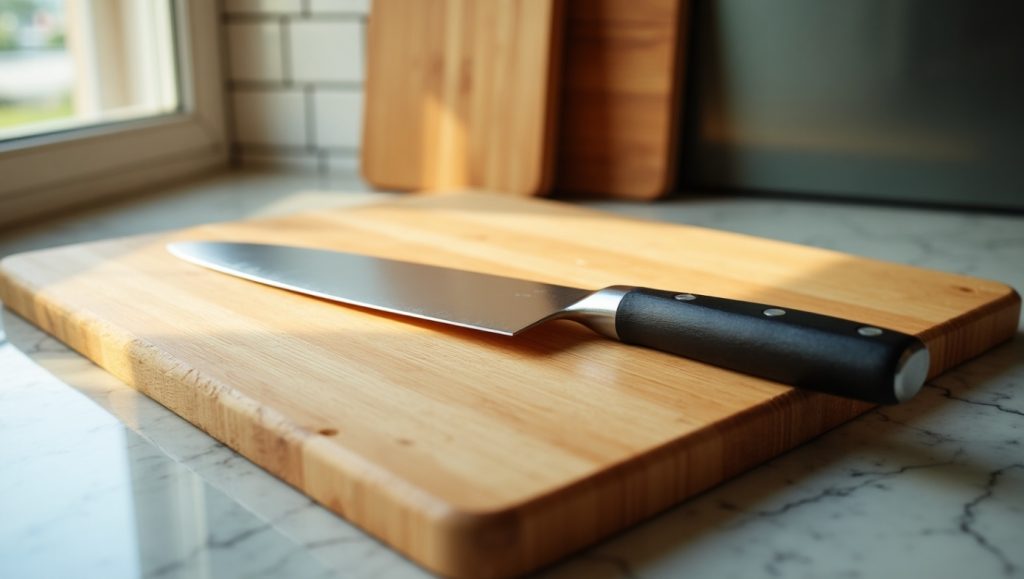
How do you pick the ideal cutting surface for your kitchen? Start by prioritizing knife edge retention—opt for Sani-Tuff rubber boards for unmatched longevity or end-grain hardwoods like maple for self-healing durability.
If hygiene’s your concern, choose Hasegawa’s hybrid boards with ionized silver to neutralize bacteria effortlessly.
Budget-tight? Grab a Paulownia wood board for affordable knife-friendliness at $30-$50. Remember to consider knife maintenance practices like regular sharpening techniques to ensure your blades stay in top condition.
For specialized tasks, use Hinoki wood for sushi to avoid taste transfer, or non-porous synthetics for meat processing.
Don’t skimp on maintenance—oil wood to prevent cracking, sanitize plastic immediately, and avoid glass or granite that’ll ruin your blades fast. Remember, wooden boards are often gentler on knives gentler on knives compared to plastic, ensuring longer edge retention.
Frequently Asked Questions
Are Bamboo Cutting Boards Safe for Food Preparation?
Hey, when it comes to food prep safety, you can trust bamboo cutting boards.
They’re naturally moisture-resistant, so they fend off bacterial growth effectively. You’ll find they don’t absorb germs as much as other materials, boosting safety.
Just make sure you clean ’em with soap and water regularly, and sanitize after use to avoid cross-contamination.
Plus, bamboo’s eco-friendly nature makes it a smart, safe choice for your kitchen.
Can Bamboo Boards Cause Allergic Reactions?
Hey, you might wonder if bamboo cutting boards can cause allergic reactions.
While bamboo’s generally hypoallergenic compared to other woods, it’s not entirely risk-free. Some folks could experience mild sneezing or skin irritation, though it’s rare.
Keep your board clean and dry to prevent mold, which can worsen allergies. If you’ve got sensitivities, test a small area first.
Choose bamboo for a safer, less reactive option.
How Do Bamboo Boards Affect Knife Handles?
When you’re using bamboo cutting boards, expect some impact on your knife handles due to the material’s high density.
You’ll exert more downward pressure, increasing stress on the handle with each cut. Though bamboo’s smooth, non-porous surface reduces slippage and moisture exposure, the repeated impact can strain grips over time.
Compared to glass or ceramic, it’s gentler, but firmer engagement’s still needed, potentially accelerating handle fatigue if you’re not cautious.
Are Bamboo Boards Suitable for Heavy Chopping?
When it comes to heavy chopping, you’ve gotta think twice about using bamboo boards. They’re prone to deep scratches and gouges from aggressive cuts, which can harbor bacteria if you’re not meticulous with cleaning.
Bamboo’s also less resistant to warping under moisture stress compared to hardwoods. You’ll need to oil it monthly to prevent cracking.
Honestly, for intense tasks, maple or acacia boards will serve you better with greater durability.
Do Bamboo Boards Retain Odors Over Time?
Imagine the sharp sting of onion lingering on your cutting board, yet the fresh breeze of bamboo’s natural scent fights back.
You’ll find bamboo cutting boards resist odors over time, thanks to their low moisture absorption and dense structure.
Don’t let food residue sit—clean with hot soapy water and dry thoroughly.
Store ‘em in dry, airy spots.
With proper care, you’re ensuring odors don’t stand a chance against bamboo’s resilience.
Bamboo and Blades: A Cutting-Edge Partnership
So, you’ve journeyed through the bamboo forest of cutting board lore, haven’t you? Fear not, for bamboo won’t dull your trusty blade as myths suggest.
Like a knight’s shield, it guards your knife’s edge with gentle strength. Choose bamboo for its eco-charm and durability, but maintain it well—oil it, clean it, cherish it.
In this kitchen quest, you’re the hero, wielding sharp steel on a surface that’s both friend and fortress.

